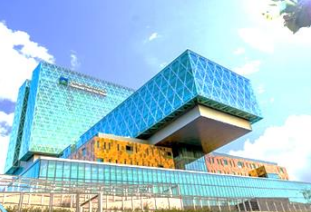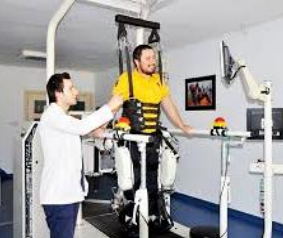The Current Status of Health Care and Rehabilitation Medicine in the UAE: Lessons From Abroad Part 3
In this third part of our series on lessons learned during my work in Abu Dhabi, I hope to give a flavor of what Health Care and Rehabilitation is like in the UAE and Gulf Region. There is no question that patients and professionals alike look upon the US as the “gold standard”. US physicians have immediate credibility, and the insurance system tries to follow Medicare guidelines and US quality. Key Performance Indicators (KPI’s) are implemented whenever possible. While it would be easy to develop an attitude of superiority, I find it important to keep perspective. First, I consider myself a guest in someone else’s home, so I don’t judge. Secondly, when I was born, this whole country was sand dunes and tents. The skyline of Abu Dhabi and Dubai attest to the incredible changes to infrastructure. Every day I am amazed driving past the Grand Mosque on the way to work, looking at the construction of our new hospital atrium or simply looking off my balcony……
At the same time, healthcare has grown at a breakneck speed. Nonetheless, it is fair to say that it takes longer to build a healthcare system than buildings. Health care literacy is very low among some of the population – especially older Emirates and poorly educated laborers (expatriates from countries like Pakistan and India).
While I can certainly not give a comprehensive review of Health Care or Rehabilitation here, I will try to briefly summarize a few key areas including Physician Services, US hospitals in Abu Dhabi and status of Rehabilitation Medicine here.
Physician Services/Licensing In contrast to the US, physicians do not have their own license that can be used anywhere. It is attached to a facility and that facility must agree to transfer the license to another provider. The process of getting a license is long, frustrating and exhausting as one needs to get a host of documents dating back to college and most need to go through an elaborate “attestation” process to prove they are authentic. This process includes local notarization, then a stamp from the State government, then a stamp from the US Department of State and finally approval from the UAE Embassy in Washington. I am told that in years past there was an epidemic of fraud in medicine here and this was the government’s solution. For those of you who think the US is over regulated, you haven’t seen anything! Also, there are 3 very distinct levels of Physicians here. As a result, the quality of care can vary from scary bad to outstanding.
General Practitioners – This could be a physician from any country, such as Somalia, with a Bachelor’s Degree in medicine. They need to pass a written test and can then be licensed but are able to bill only very basic levels of care.
Specialists – These physicians generally come from more developed countries and need to pass a much more rigorous written and oral test to be licensed at this level. They can see more complicated patients and bill a higher level of care.
Consultants – These physicians come from countries like the US, UK, Canada and Australia. They need to pass an even more difficult set of written and oral exams. Of note, a US Board Certified physician automatically has testing requirements waved and comes in as a top tier Consultant once they get through the certification and attestation process.
US hospitals in the UAE
Several US hospitals have facilities in the UAE. The best known is certainly Cleveland Clinic Abu Dhabi. This is a large palace of a facility that was built to reduce the need for Emirati citizens to go to the US or Germany for care. If care for a condition is not available in the UAE, then it is the government’s policy to pay for an Emirati citizen to go abroad for care. This often involves trips that are weeks or months and includes funding for family members and a spending allowance. The cost savings of keeping that care in country is obviously enormous. This has led to incredible investments including the amazing facility of Cleveland Clinic Abu Dhabi with it’s unique structure and enormous atrium complete with full grown palm trees.
Other US hospitals have affiliations with local hospitals. For example, the rehabilitation hospital I am working for, Specialized Rehabilitation Hospital, has a 5 year affiliation with Shirley Ryan Ability Lab (formerly called Rehabilitation Institute of Chicago) – the number one ranked rehabilitation facility in the US (arguably in the world). This affiliation goes far beyond name branding and includes ongoing consultation and quality of care monitoring to assure the level of care is as close as possible to that provided in the US.
Rehabilitation in the UAE
In many ways, rehabilitation in the UAE is in it’s infancy. Even the term “Rehabilitation” has vague meaning to many providers and is often used for individuals in Long Term Care who have no functional goals. This may include individuals who are non-responsive and on long term ventilator care (ventilators are not discontinued here).
Acute Inpatient Rehabilitation Units are just starting to appear. Most are converted “villas” (residences) that are on the grounds of Long Term Care facilities. Specialized Rehabilitation Hospital will be the first rehabilitation facility built specifically for that purpose in Abu Dhabi.
High end equipment such as robotic devices and virtual reality exercise equipment is sought out by some Emirati patients even if there is little data to prove its usefulness. Providing quality care and outcomes requires doing a careful dance between known/proven treatment methods and meeting expectations for patients and families who may surf the internet but have limited health care literacy.
Similarly, in outpatient rehabilitation, using equipment such as electrical stimulation, shock wave or ultrasound is expected even if not clearly indicated for a condition. It is often necessary to provide some of these services in order to also get a patient to ”buy in” to the need for individualized exercise in therapy and at home.
In summary, working in HealthCare in the UAE is humbling. I have become acutely aware of the quality of care in the US. For all the debates about how to administer Health Care in the US, we should not loose sight that the quality of care provided is the envy of the world. I am also very aware of the fact that patients in the US are far more equipped to be knowledgeable health care consumers. If you began reading this article feeling overwhelmed with Healthcare decisions in the US, it’s important to remember that Americans are well ahead of so many others around the world, in our understanding and expectations of quality. I am realizing this truth more each and every day I am here.



